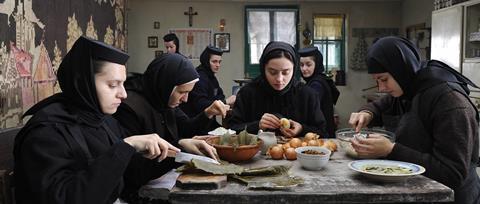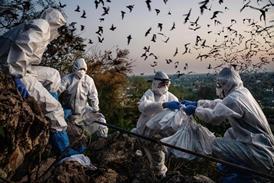Dir/scr: Cristian Mungiu. Romania-France-Belgium. 2012. 150mins

Spare, unadorned and strikingly shot, Cristian Mungiu’s film is an unusual rendering of a Romanian exorcism case and is bound to split both audience and critical opinions, some considering it a major achievement and others blaming it for overlong pretentious sensationalism. But it will certainly not pass unnoticed.
Mungiu lavishes attention on backdrop details that underline the particular character of the story.
It is inspired by a two non-fiction novels written by Tatiana Niculescu Bran, a BBC correspondent who investigated the case of a young woman supposedly possessed by evil spirits in 2005 and who was tortured to death in a Romanian monastery to drive the devil out of her body. Mungiu’s script tackles such major themes as love, faith, freedom of spirit versus rigid religion, ignorance and poverty, providing a fertile background for the inevitable ensuing conflicts.
He has no outright heroes or villains, with each character in Beyond The Hills (Dupa dealuri) sincerely believing he is right - the ultimate tragedy being therefore unavoidable.
Willful Alina (Cristina Flutur) comes back to Romania to extricate her docile orphanage friend Voichita (Cosmina Stratan), away from the grip of a remote Orthodox monastery in which she has found some sort of peace of mind.
She wants Voichita to come with her to Germany, and can’t understand her reticence, rejecting everything the monastery’s regime stands for and when denied the one thing she wants most in life - Voichita’s company - she loses control of herself and has to be put in a hospital. Once she calms down the doctors claim there is nothing more they can do for her and since she has nowhere else to go to, she returns to the monastery to recuperate, despite the reservations of the head priest (Valeriu Andriuta), whose soft spoken demeanor hides an iron fist.
Alina’s fuse soon blows again and the priest allows himself to be persuaded into exorcising the evil spirit controlling her. He reads prayers while she is gagged and chained to a makeshift cross and by the time the battle for her soul seems to have been won, her body has already given up.
Moving at an unhurried pace Mungiu lavishes attention on backdrop details that underline the particular character of the story, such as the rudimentary conditions the nuns live in (no running water and no electricity), the unpaved roads and the frozen winter landscape.
Lacking previous feature film experience, both Flutur, a stage actress, and Stratan, a former TV reporter, have been amazingly well cast to fit their roles while Andriuta’s assertive priest, the one character that would be closest to a villain in this piece, and Dana Tapalaga’s kind-hearted Mother Superior, have a human dimension that comes through every time and again, despite utter their submission to the rules.
Production company: Mobra Film, Why Not Productions, Les Films du Fleuve, France 3 Cinema, Mandragora Movies
International sale:s Wild Bunch, www.wildbunch.eu
Producer: Cristian Mungiu
Cinematography: Oleg Mutu
Editor: Mircea Olteanu
Production designer: Calin Papura, Mihaela Poenaru
Main cast: Cosmina Stratan, Cristina Flutur, Valeriu Andriuta, Dana Tapalaga, Catalin Harabagiu, Gina Tandura, Vica Agache, Nora Covali, Dionisie Vitcu





















